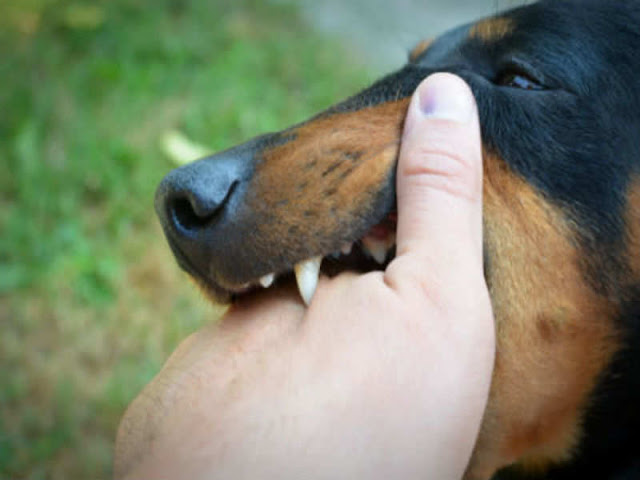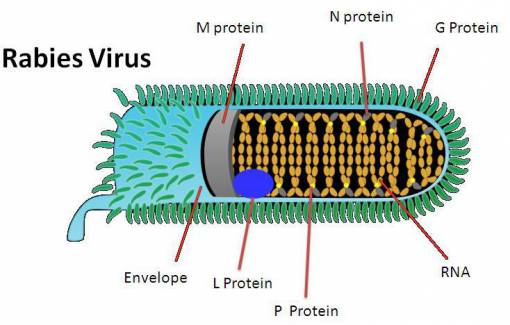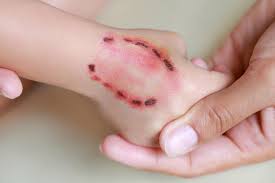What is rabies?
Rabies is a deadly virus spread to people from saliva of infected animals. Causative agent of rabies is a virus that is transmitted through saliva and bites. Did cat or dog bite you? take it serious. click here
 |
| Rabies is a deadly virus spread to people from saliva of infected animals |
Animals that are most likely to transmit rabies in United States include bats, coyotes, foxes, raccoons and skunks. In developing countries of Africa and Southeast Asia, stray dogs are the most likely to spread rabies to people.
Once a person starts showing signs and symptoms of rabies, the disease is nearly always fatal. For this reason, anyone who may have a risk of contracting rabies should receive rabies vaccines for protection.
Signs and symptoms of rabies
The first symptoms of rabies may be very similar to flu and may last for days. Signs and symptoms of rabies include fever, headache, nausea, vomiting, agitation, anxiety, confusion, hyperactivity, difficulty swallowing, excessive salivation, hydrophobia (fear of water because of difficulty in swallowing), hallucinations, insomnia and partial paralysis.
When to see a doctor?
Seek immediate medical care if you are bitten by any animal. Based on your injuries and the situation in which the bite occurred, you and your doctor can decide whether you should receive rabies treatment or to prevent rabies.
Even if you are not sure whether you have been bitten, seek medical attention. For instance, a bat that flies into your room while you are sleeping may bite you without you noticing it. I you awake to find a bat in your room, assume you have been bitten. Also if you find a bat near a person who can not report a bite, such as a small child or a person with a disability, assume that person has been bitten.
Causative agent of rabies and transmission of rabies
Rabies infection is caused by rabies virus. Rabies virus spreads through saliva of infected animals. Infected animals can transmit rabies virus by biting another animal or a person. In rare cases, unusual transmission of rabies can occur when infected saliva gets into an open wound or the mucous membranes such as mouth or eyes. This can occur if an infected animal were to lick an open cut or wound on your skin.
 |
| Causative agent of rabies is a virus that is transmitted through saliva and bites |
Animals that can transmit rabies include pets and farm animals, cats, cows, dogs, ferrets, goats, horses, wild animals, bats, beavers, coyotes, foxes, monkeys, raccoons, skunks, woodchucks and all kind of mammals (animals that suckles its young).
In rare cases, the rabies virus transmission has been reported to tissue and organ transplant recipients from an infected organ.
Rabies, who is at risk?
Risk factors that can increase your risk of rabies are discussed as follows.
Traveling or living in developing countries where rabies is more common, including countries in Africa and Southeast Asia.
Activities that are likely to put you in contact with wild animals that may have rabies, such as exploring caves where bats live or camping without taking precautions to keep wild animals away from your campsite.
Working in a laboratory with the rabies virus.
Wounds to the head, neck or hands which may help the rabies virus travel to your brain more quickly.
Preparing for your appointment with doctor
If an animal bites you, seek medical attention for the wound. Also tell the doctor about the circumstances of your injury. The doctor will ask the questions like,
What animal bit you?
Was it a wild animal or pet?
If it was a pet, do you know to whom the animal belongs?
Can you describe the animal's behavior before it bit you? Was the animal provoked?
Were you able to capture or kill the animal after it bit you?
What can you do in the meantime?
Wash your wound gently and thoroughly with soap and generous amounts of water. This may help wash away the virus. Things you must do after an animal bite as soon as possible, click here
If the animal that bit you can be contained or captured without causing more injury, do so. Do not kill the animal with a blow or a shot to the head as the resulting injuries may make it difficult to perform laboratory tests to determine whether the animal has rabies. Tell your doctor that you have captured the animal that bit you. Your doctor may then contact the local health department to determine what to do with the animal.
 |
| Wash your wound gently and thoroughly with soap and generous amounts of water |
At the time a rabid animal bites you, there no way to know whether the animal has transmitted the rabies virus to you. For this reason, treatment to prevent rabies from infecting your body is recommended if the doctor thinks there is a chance you have been exposed to the virus.
Treatment of rabies
There is no specific treatment for rabies infection. Though a small number of people have survived rabies, the disease is usually fatal. For this reason, if you think you have been exposed to rabies, you must get a series of shots to prevent the rabies virus from infecting you.
If the animal that bit you can not be found, it may be safest to assume that the animal has rabies. But this will depend on several factors such as the type of animal and the situation in which the bite occurred.
Rabies shots include; Rabies vaccines available in Pakistan, click here
A fast acting shot (rabies immune globulin) to prevent the virus from infecting you. Part of this injection is given near the area where the animal bit you if possible, as soon as possible after the bite.
A series of rabies vaccines to help your body learn to identify and fight the rabies virus. Rabies vaccine is given as injection in your arm. Your receive 4 injections over 14 days.
Determining whether the animal that bit you has rabies
In some cases it is possible to determine whether the animal that bit you has rabies before beginning the series of rabies vaccine shots. That way, if it is determined the animal is healthy, you won't need the shots. Why do cats bite when you pet them? To read about petting induced aggression in cats click here
Follow the given guidelines to determine if the animal that bit you had rabies or not.
Pets and farm animals like cats, dogs and ferrets that bite can be observed for 10 days to see if they show signs and symptoms of rabies. If the animal that bit you remains healthy during the observation period then it does not have the rabies and you won't need rabies vaccine shots.
Other pets and farm animals are considered on a case-by-case basis. Discuss with your doctor and local public health officials to determine whether you should receive rabies shots.
Wild animals that can be found, caught and captured, such as a bat that came into your home, can be killed if tested positive for rabies. Tests on animal's brain may reveal the rabies virus. If the animal does not have the rabies, you won't need rabies vaccine shots.
If the animal that bit you could not be found, discuss the situation with your doctor and the local health department. In certain cases, it may be safest to assume that the animal had rabies and proceed with the rabies shots. In other cases, it may be unlikely that the animal that bit you had rabies and it may be determined that rabies shot are not not necessary.
Home remedies for rabies and changing life style
You can reduce your risk of coming in contact with rabid animals. Here is how;
Vaccinate your pets
Cats, dogs and ferrets can be vaccinated against rabies. Ask your veterinarian how often your pets should be vaccinated. You can contact a local veterinarian in your city for vaccination. Click here to find a vet near you | Contact list of veterinary doctors near me in Pakistan
Keep your pets confined
Keep your pets inside and supervise them when outside. This will help keep your pets from coming in contact with wild animals.
Protect small pets from predators
Keep rabbits and other small pets such as guinea pigs, inside or in protected cages so that they are safe from wild animals. These small pets can not be vaccinated against rabies.
Report stray animals to the authorities
Call your local animal control officials or other local law enforcement to report stray dogs and cats.
Don't approach wild animals
Wild animals with rabies may seem unafraid of people. It is not normal for a wild animal to be friendly with people, so stay away from any animal that seems unafraid.
Keep bats out of your home
Seal any cracks and gaps where bats can enter in your home, work with a local expert to find ways to keep bats out.
Consider the rabies vaccine if you are travelling
If you are travelling to a country where rabies is common, and you will be there for a long period of time, ask your doctor whether you should receive the rabies vaccine.
No comments:
Post a Comment